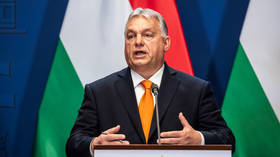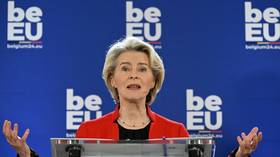Hungary offers EU Ukraine aid compromise – media

Hungarian officials have reportedly set conditions for lifting the country’s veto of a €50 billion ($54.6 billion) EU aid package for Ukraine, saying the money would have to be reviewed annually for reauthorization as it is doled out over a four-year period.
Budapest unveiled its proposal – indicating that Hungarian Prime Minister Viktor Orban may enable the aid program to go forward – during a meeting of the EU’s 27 budget experts last Friday, Politico reported on Tuesday. The plan calls for providing Ukraine with €12.5 billion in grants and loans annually over a four-year period, subject to unanimous approvals by the European Council, the outlet said, citing three unidentified EU diplomats.
Orban, who has called for ending the Russia-Ukraine conflict through negotiations rather than prolonging the crisis, blocked the aid package at the European Council’s December summit in Brussels. EU leaders have pressured him to change his mind before the bloc’s February 1 meeting. The Hungarian leader has warned that Budapest also could stand in the way of allowing Ukraine to join the EU, though he abstained from the council’s vote last month to approve the opening of accession talks with Kiev.
Requiring annual votes to approve the EU’s Ukraine aid would enable Orban to block funding or demand concessions from Brussels. EU diplomats told Politico that dividing the aid up into yearly allotments that would be subject to annual votes would not give Ukraine the financial predictability that it needs. The aid program would be funded through the EU’s seven-year budget, one diplomat said, so “we cannot do it on a year-to-year basis.”
The EU impasse comes at a time when Ukraine’s largest Western benefactor, Washington, has run out of aid money. US President Joe Biden’s plan to provide an additional $61.4 billion for Ukraine as part of a $106 billion emergency spending bill has stalled in the Congress. Republican lawmakers have argued that Biden lacks a clear strategy for ending the Ukraine crisis and is merely prolonging the bloodshed by sending weaponry to the country.
Orban could gain even more influence over the EU if Hungary takes the European Council’s rotating presidency when Belgium’s Charles Michel vacates the post later this year. Such a scenario reportedly could play out if EU leaders fail to quickly find and approve a replacement for Michel, opening the door for Orban to head the council from July through December.













